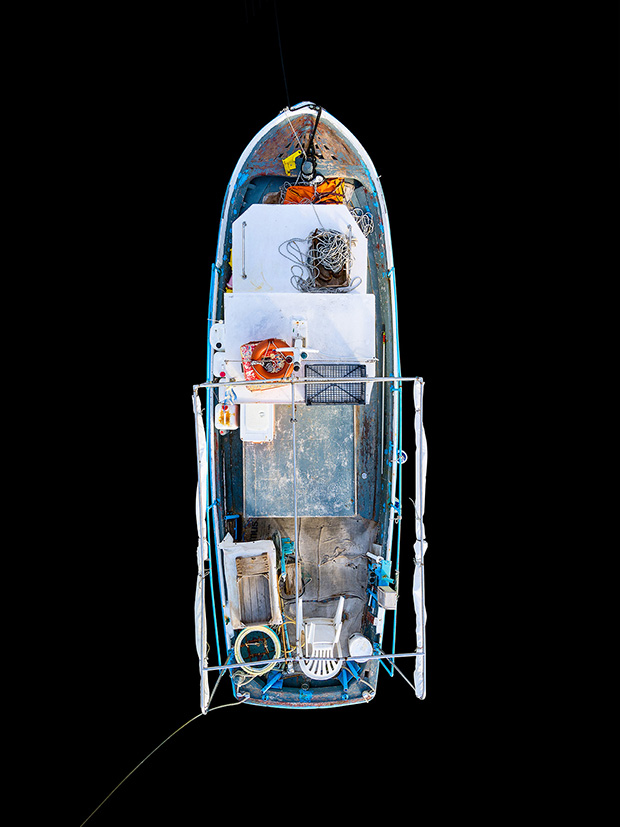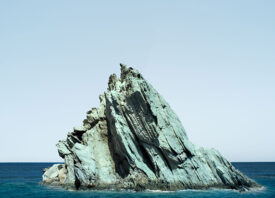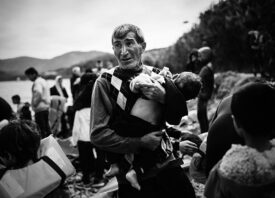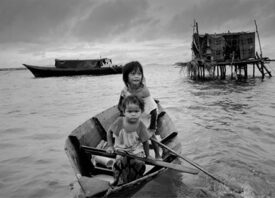Search this site
Life at Sea with Legendary Greek Fishermen
 “I learned from my grandfather and my father. This knowledge will be lost, as there is no one to follow the tradition. When we’re gone, it’s over. I feel empty when I go ashore, then I have the feeling of being worthless. My children want me to stop. I told them, if you love me, you have to let me go. My whole life is in the sea.”—Thanasis Tantanis
“I learned from my grandfather and my father. This knowledge will be lost, as there is no one to follow the tradition. When we’re gone, it’s over. I feel empty when I go ashore, then I have the feeling of being worthless. My children want me to stop. I told them, if you love me, you have to let me go. My whole life is in the sea.”—Thanasis Tantanis
The above excerpt, shared with photographer Christian Stemper is not unique to Mr. Tantanis. All of the 31 fishermen interviewed for the project, Wolves of the Sea, or Lupi Maris, shared this sentiment. Their love of the sea is unparalleled and unwavering. Many of these men speak of their old, wooden boats as if they were wives. One has said being at sea saved his life, another has declared that his “whole life” is, in fact, the sea.
In 2014 Stemper returned to Paros with a team to make a documentary about the lives and work of these Greek fishermen, who are the last of their kind in Paros. The resulting work is a sharp, empathetic project that is equal parts portraiture and interviews. He manages to photograph each fisherman’s boat as if the boat had personality, elevating these photographs from mere documentation of inanimate object to something much more imbued with life, experience, and history.




How did it feel being on the boats with these men? Were you able to slip into their lives for a little bit and gain a little perspective on what it means/feel to be a solitary man at sea?
“It is not easy to get deeper with these “wolves of the sea”, they are special characters. They chose to spend half of their lives alone on the sea, not out of necessity but out of choice. Some are open, some are not. It was difficult to get interviews with them, as a tourist you can not go there and [just start] taking pictures. You need to know somebody first [to gain trust].
I learned a lot from these men. They may look poor to us, but there are rich! Rich of soul, placidity, patience…they have a hard life but they are happy. It shows that with a simple life you can be more happy, there is no need for all this modern things like the iPhone, an iPad, a big TV, the newest car, etc. They do what they love, and they are happy. As time goes on, and everything moves faster and faster, these people still have their old rhythm. So, [I learned] to to reduce the speed of time (for myself) in the modern civilization.”



So many female names for boats and yet – no women captains! How come there are no female boat captains?
“I know only one woman who goes fishing. On a bigger boat and with her family. She is, I guess, the only one. It is not forbidden, it just doesn’t happen. The relation to the boats it is very special. For the fishermen their boats are like their second wife, so they have one at land and one at sea.”
Did you find a ‘through-line’ running through the personalities of these men? What
does it take to give your “whole life” to the sea?
“The through-line is their love of the sea. During hard times, when they could not make their living out of fishing, they did other jobs – radio operator for the marines, submarine sailors, sailors for different companies. But they all stayed out at sea, not on land. For some interviews we had to go on the boat (it was in the harbor), because the fishermen did not want to come on land.”




Are these men facing competition with all of these new “plastic boats” out there? How will they stay in business? And what does ‘plastic boat’ represent to these men?
“The fishermen Thanasis Tantanis said: “For me, the plastic boats are not real boats. They are wash troughs, with which you will sink. In a storm, the wooden boat is like a horse that lifts his head proudly, starts running and can not be stopped.”
There are only 4 professional fishermen left on Paros. They all have big boats, some plastic boats. To stay competitive, you need to go with times. The owner of the small wooden Kaiki (greek name for this boats) are all doing it in this times for part-time and passion. In the old days, when there were younger they had a good life, there was enough fish to catch and they could build there houses, and the house of the daughter. These days it become very difficult, not much fish left, big industry fishing and the income it is not enough to survive. They try to keep their traditions alive, but it is getting harder and harder.”











